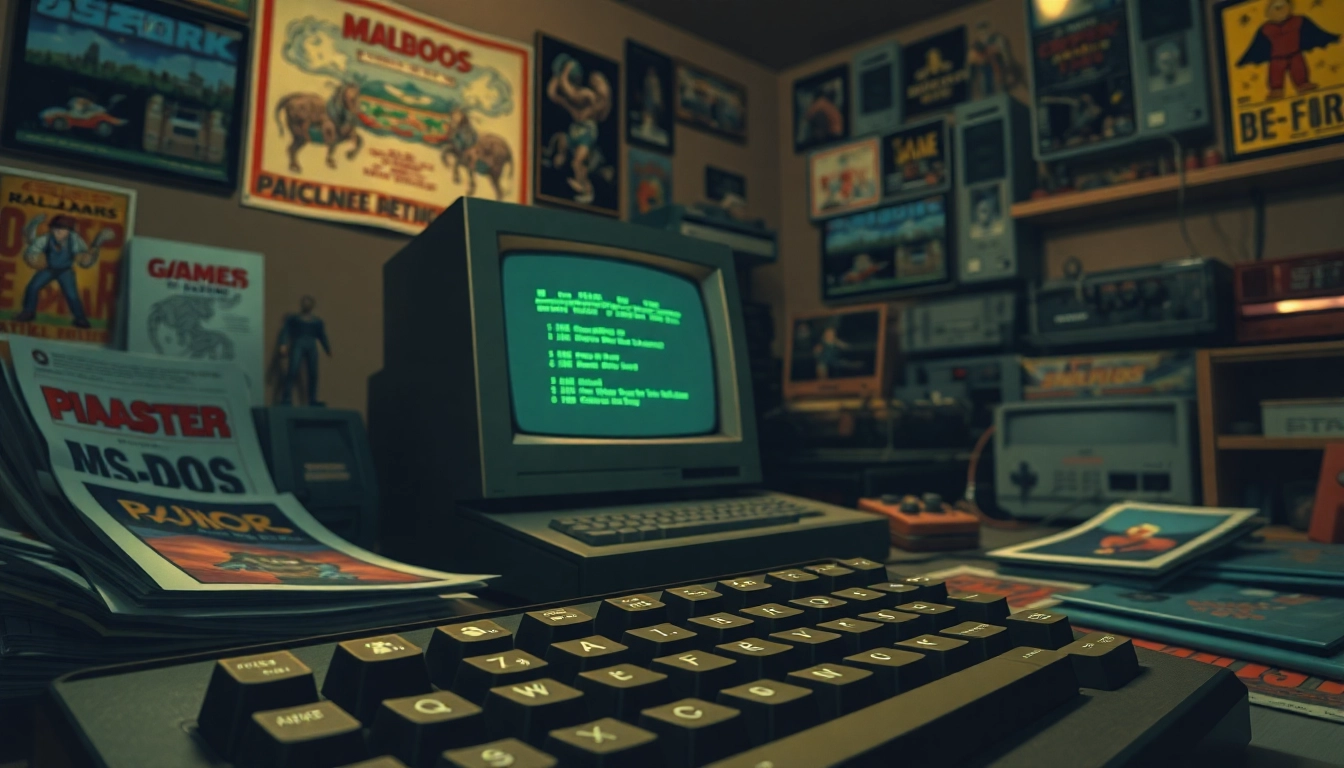Understanding DOS Games
What Are DOS Games?
DOS games are classic video games developed for the MS-DOS operating system, which was widely used in the 1980s and 1990s. These games are characterized by their text-based interfaces, pixelated graphics, and simple sound mechanics. Despite their limited technology compared to modern standards, DOS games hold a nostalgic value for many gamers who grew up playing them. The appeal lies in their straightforward gameplay, imaginative storylines, and significant historical impact on the gaming landscape.
History and Evolution of DOS Games
The history of DOS games began in the early 1980s when computers started becoming accessible to the public. In these formative years, games like “Zork” and “King’s Quest” set the stage for future development with their innovative use of text-based commands and graphics. Over the years, advancements in technology and user interface design led to the introduction of iconic games such as “Doom,” “Wolfenstein 3D,” and “Duke Nukem 3D.” These games showcased the potential of DOS as a gaming platform and influenced an entire generation of game developers.
As personal computers evolved, so did DOS games. With the increasing popularity of graphical interfaces and the advent of consoles, the DOS gaming scene began to wane by the late 1990s. However, the rise of the internet and the retro gaming movement sparked renewed interest in these classics, leading to a resurgence in the availability and playability of DOS games in modern browsers.
Popular Genres in DOS Games
DOS games span various genres, each offering unique gameplay experiences. Some of the most popular genres include:
- Action Games: Fast-paced and often competitive, these games, like “Doom” and “Duke Nukem,” focus on shooting, reflexes, and quick decision-making.
- Adventure Games: Titles like “Monkey Island” and “King’s Quest” emphasize storytelling, puzzle-solving, and exploration, often featuring rich narratives and character development.
- Role-Playing Games (RPGs): Classics such as “Ultima” and “Fallout” engage players in immersive worlds where character customization and storyline choices play crucial roles.
- Simulation Games: Titles like “SimCity” replicate real-world scenarios, allowing players to build and manage their empires, from cities to businesses.
- Strategy Games: Games such as “Civilization” and “Warcraft” prompt players to think critically and plan effectively, combining resource management with tactical decision-making.
How to Play DOS Games Online
Finding the Right Platforms to Play DOS Games
With the continued popularity of DOS games, several platforms now allow enthusiasts to play dos games online. These platforms often provide a user-friendly interface for easy navigation and gameplay enjoyment. Particularly notable platforms include:
- Online Emulators: Websites like DOSBox and ClassicReload host a vast array of DOS games that can be played directly in your browser.
- Gaming Archives: Some websites focus on preserving older games and allow for both online play and downloads for offline use.
- Community Platforms: Online forums and gaming communities often curate lists of available DOS games, linking gamers to the right resources.
Setting Up for Optimal Experience
To fully enjoy your DOS gaming experience, it’s essential to set up your system appropriately. Optimal settings include:
- Adjusting Display Settings: Some DOS games may require compatibility adjustments for modern screens. Utilize fullscreen modes if available, or tweak your resolution for better gameplay.
- Configuring Input Methods: Many DOS games were designed for keyboard input. Familiarize yourself with the controls and consider using a keyboard with good response times for an authentic experience.
- Sound Configuration: Emulators may allow for enhanced sound settings. Experiment with audio options to complement gameplay.
Saving Progress While You Play DOS Games
One significant advancement in the revival of DOS games is the ability to save your progress. While original games often required players to rely on passes or saved files, modern platforms have introduced cloud saving or in-browser saving features. Players should:
- Check if the platform supports saving progress; many sites now offer this feature.
- Utilize save slots effectively, allowing you to maintain multiple game states for different gameplay experiences.
- Be aware of any limitations on saving, as some platforms may restrict total saves or require user accounts.
Tips for Getting the Most Out of Your DOS Gaming Experience
Best Practices for Playing DOS Games
Enhancing your experience while playing DOS games involves understanding their dynamics and mechanics. Here are some best practices:
- Take time to read instructions or tips typically provided at the start of each game; these can significantly impact your performance.
- Consider using emulators that allow you to modify game speeds or settings, helping you to tailor your experience.
- Regularly adjust your strategy based on game progression. Utilize walkthroughs and forums to guide gameplay and build effective tactics.
Essential Tools and Emulators for Playing DOS Games
Several tools and emulators have emerged, simplifying the process of playing DOS games on modern systems. Some notable options include:
- DOSBox: This popular emulator allows users to run thousands of DOS games on various systems, providing the flexibility needed to adapt older titles to modern environments.
- ScummVM: Specifically designed for point-and-click adventure games, ScummVM simplifies the gaming experience for titles from that genre.
- Game Engines: Certain retro games have been re-engineered for new platforms, maintaining their core gameplay while enhancing graphics and performance.
Developing a Gaming Strategy for Classic DOS Games
Strategizing is crucial in many DOS games, especially in genres like RPGs and strategy games. Consider these strategic tips:
- Understand the strengths and weaknesses of your character or units; this knowledge will improve your decision-making process.
- Plan resource management efficiently. Many games have limited supplies or currency that require careful balancing.
- Engage with community strategies, learning from other players’ experiences and adapting them to your style.
Community and Resources for DOS Game Enthusiasts
Join Discussions on DOS Gaming Forums
The gaming community around DOS games is vibrant and helpful. Participating in discussions can broaden your understanding and appreciation of these titles:
- Engage with forums to troubleshoot issues. They often have dedicated sections for troubleshooting common problems with various titles.
- Seek game recommendations based on other players’ experiences. Recommendations can be invaluable when discovering lesser-known classics.
- Share your experiences and strategies, enriching the community by contributing your insights.
Accessing Resources and Guides for DOS Games
Countless resources exist to enhance your gameplay, from written guides to video tutorials. Explore various media:
- Look for online guides that detail gameplay mechanics, character builds, or level strategies.
- Watch video tutorials for visual learning, especially helpful for complex mechanics that are easier to demonstrate than describe.
- Utilize game wikis, often rooted in player contributions, offering up-to-date and comprehensive information on individual games.
The Future of DOS Games and Retro Gaming
The future of DOS games is promising, driven by the passion of retro gaming enthusiasts. Several trends are impacting this preservation:
- Increased Accessibility: With more platforms offering DOS games, accessibility continues to improve, enabling a wider audience reach.
- Modern Updates: Developers are reviving old titles with new content, appealing graphics, and improved interfaces, catering to both old fans and new players.
- Community Preservation Efforts: Engaged communities are vital in preserving these classic games, often creating comprehensive archives to ensure these titles aren’t lost to time.
FAQs About Playing DOS Games
Common Issues When Trying to Play DOS Games
Many players encounter challenges while navigating the realm of DOS games. Some common issues include:
- Compatibility issues with modern hardware and software; using emulators like DOSBox can significantly mitigate these problems.
- Challenges with controls or input methods; adjusting emulator settings often resolves these concerns.
- Difficulty in finding specific titles; community forums and repository websites frequently catalog available games.
Finding Missing Game Files and Support
Migrating classic titles can lead to missing files. To recover or troubleshoot these instances:
- Check various gaming archives online, as many maintain repositories of entire titles potentially including missing components.
- Consult community forums for advice; often, seasoned players can provide links or suggest alternative sources for missing files.
- Utilize mods or patches developed by the community for particular games that enhance compatibility with modern systems.
Engaging with Other Fans of DOS Games
Engaging with other fans can deepen your appreciation of DOS games and present opportunities to collaborate:
- Follow social media channels or groups dedicated to retro gaming, providing insights and updates on new developments within the DOS gaming community.
- Participate in events or gaming competitions where DOS games are featured, fostering connections with like-minded individuals.
- Write or contribute reviews and player experiences to forums or blogs, enhancing community resources while sharing your unique perspective.



